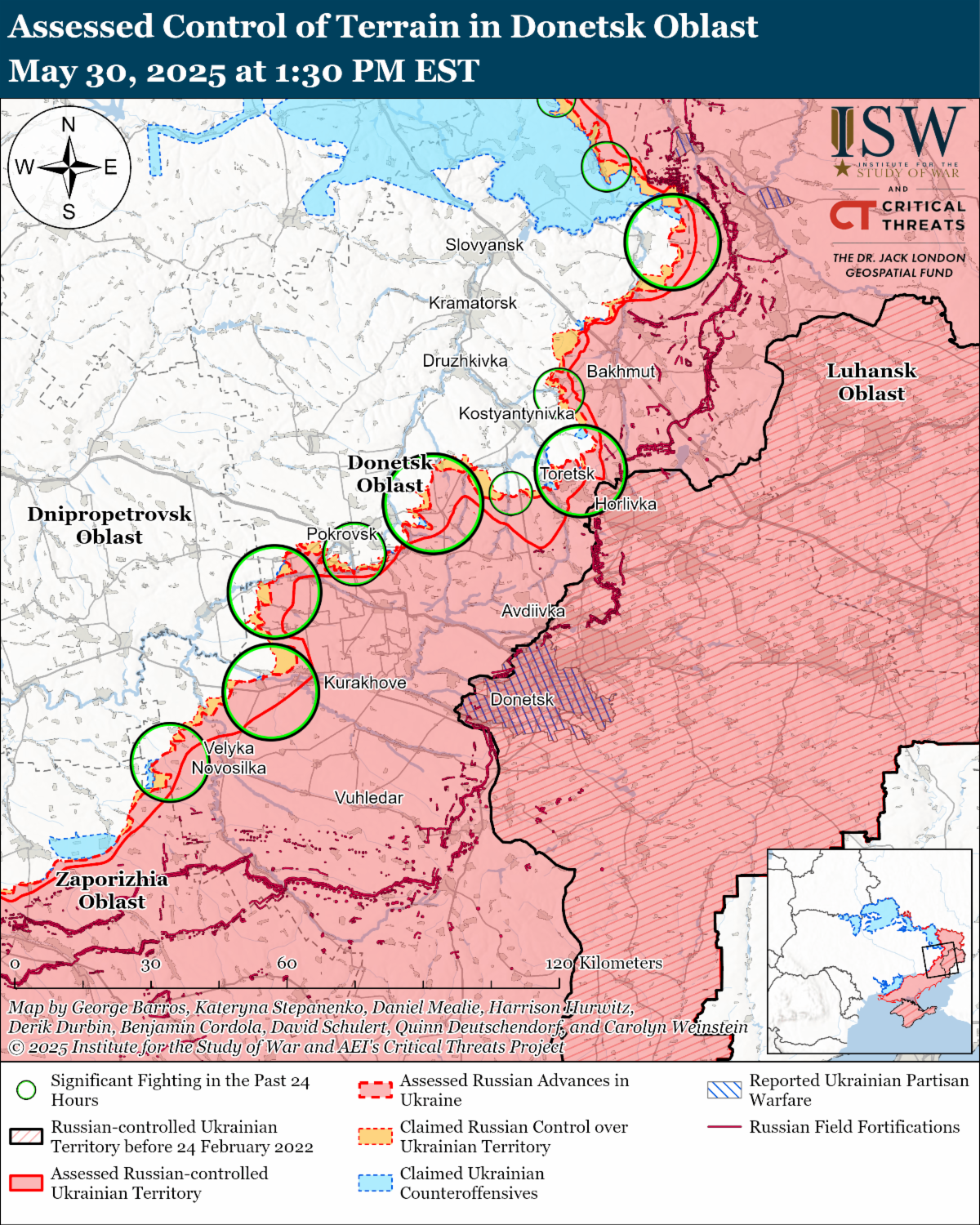Russian officials continue to signal the Kremlin's uncompromising position ahead of proposed talks in Istanbul on June 2, suggesting that the upcoming Istanbul meeting is very unlikely to yield substantive results in support of an enduring peace in Ukraine. Russian Permanent Representative to the United Nations (UN) Vasily Nebenzya claimed during a UN Security Council meeting on May 30 that Russia is prepared to fight Ukraine for as long as necessary and that Ukraine can either accept peace, presumably on Russia's terms, or face inevitable battlefield defeat. Nebenzya stated that the United States recently "opened its eyes" to the "root causes" of the war in Ukraine and reiterated Russian President Vladimir Putin's demands that the West stop arming Ukraine and that Ukraine cease force generation efforts as preconditions to a ceasefire. CEO of the Russian Direct Investment Fund (RDIF) and Presidential Special Representative for Investment and Economic Cooperation with Foreign Countries Kirill Dmitriev also called for officials to eliminate the conflict‘s "root causes" in an English-language post to X on May 30. Russian Foreign Minister Sergei Lavrov previously defined the root causes of the war in Ukraine as NATO's eastward expansion following the Soviet Union’s collapse in 1991 and the Ukrainian government's alleged discrimination against Russian speakers and Russian culture. Russian Ministry of Foreign Affairs (MFA) Spokesperson Maria Zakharova claimed on May 29 that Russia’s delegation to the proposed bilateral discussion in Istanbul on June 2 will be the ”same” as Russia's delegation at previous talks held in Istanbul on May 15 and 16. Russia sent a low-level delegation led by Presidential Aide Vladimir Medinsky and consisting of Deputy Foreign Minister Mikhail Galuzin, Chief of the Russian General Staff's Main Directorate (GRU) Igor Kostykov, and Deputy Defense Minister Alexander Fomin to the May 15-16 Istanbul talks.
Russian officials' decision to reiterate long-standing demands and send the same low-level delegation to the next Istanbul meeting indicates that Russia remains disinterested in engaging in good-faith negotiations. ISW continues to assess that Russia remains dedicated to protracting peace negotiations to support continued offensive operations in Ukraine and extract additional concessions from Ukraine and the West.
Russian officials are pocketing major US concessions and continuing to make further demands of Ukraine and the West. Kremlin Spokesperson Dmitry Peskov claimed on May 30 that Kremlin officials are encouraged by the Trump administration's understanding of Russian President Vladimir Putin’s concerns about further eastward expansion of NATO and that Russia has previously shared these concerns with the United States during closed-door negotiations. Peskov stated that the US position on further NATO expansion is "very appealing" to Russia, given that the United States continues to play a mediating role in negotiations to end the war.
US officials previously indicated a willingness to consider Russia’s objections to Ukraine’s possible future NATO membership – a long-standing Russian demand that officials frequently claim to be a "root cause" of the war in Ukraine – in exchange for Russia making concessions on other demands. Peskov’s statement indicates that Russian officials assess that the United States supports Russia's demand for NATO to alter its foundational open-door policy. Such a commitment would effectively grant Russia a veto over elements of the NATO charter, disproportionally benefit Russia’s desired postwar security posture, and undermine US President Donald Trump‘s stated objectives of achieving a just and lasting peace in Ukraine. Russian officials are pocketing US concessions regarding negotiations and potential postwar security arrangements and are failing to make any comparable concessions, such as relinquishing Russia’s claim to currently unoccupied Ukrainian territory like Kherson and Zaporizhia oblasts.
Key Takeaways:
- Russian officials continue to signal the Kremlin's uncompromising position ahead of proposed talks in Istanbul on June 2, suggesting that the upcoming Istanbul meeting is very unlikely to yield substantive results in support of an enduring peace in Ukraine.
- Russian officials are pocketing major US concessions and continuing to make further demands of Ukraine and the West.
- Russian forces recently advanced near Toretsk, Novopavlivka, and Kurakhove.
| 




 [ISW] 이란 업데이트, 2025년 5월 30일
[ISW] 이란 업데이트, 2025년 5월 30일
 [ISW] 러시아군 생성 및 기술 적응 업데이트 2025년 5월 30일
[ISW] 러시아군 생성 및 기술 적응 업데이트 2025년 5월 30일